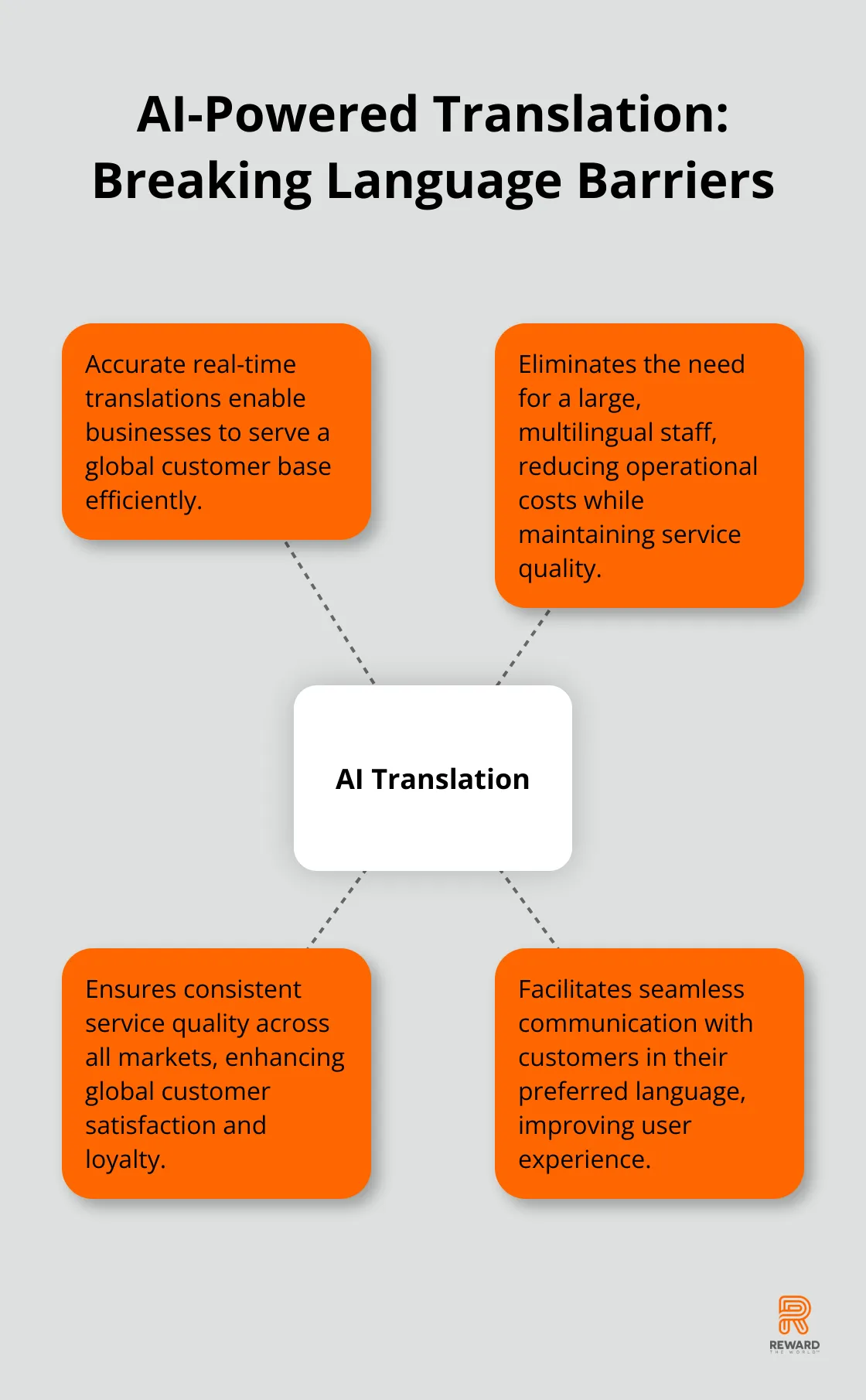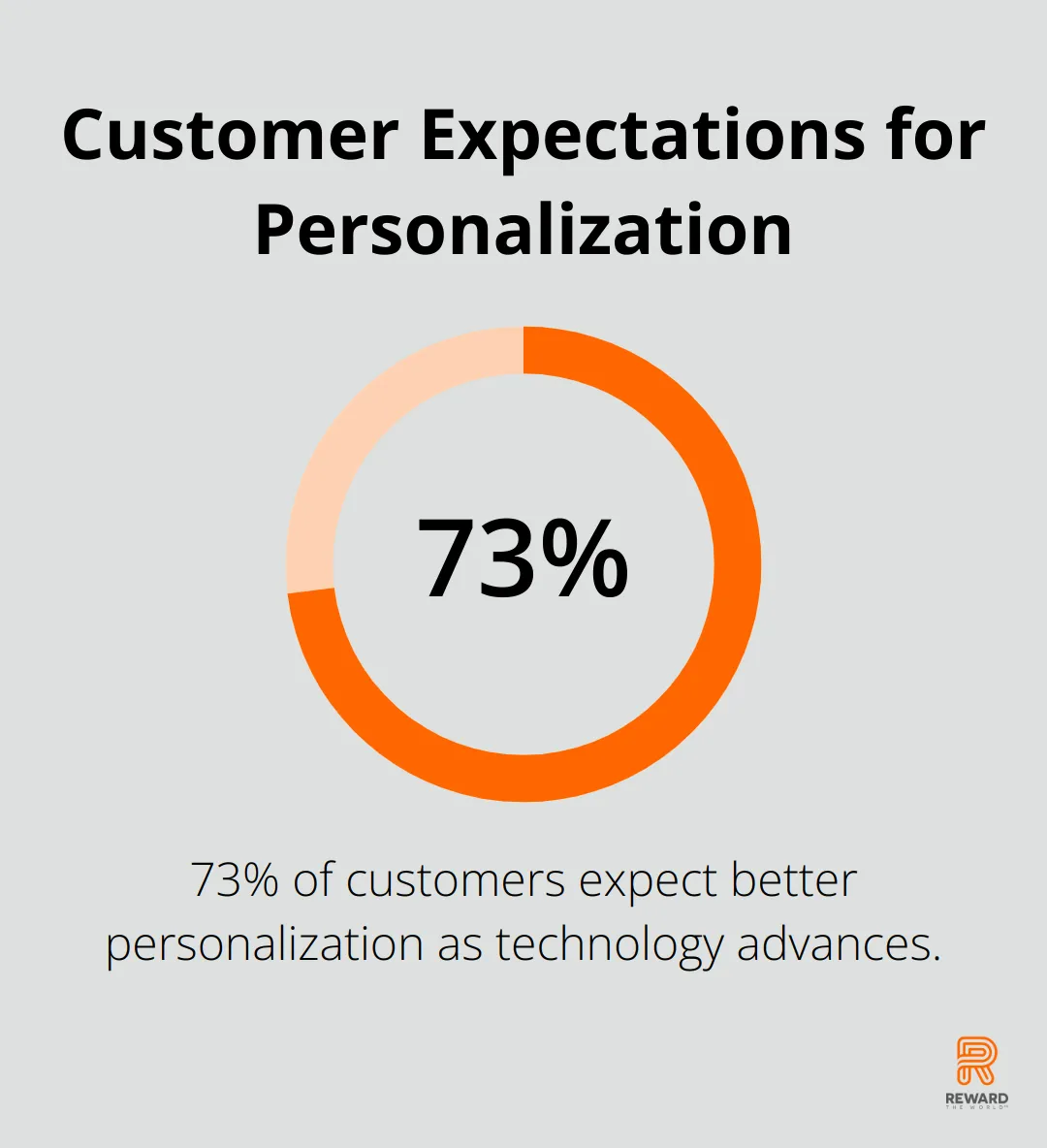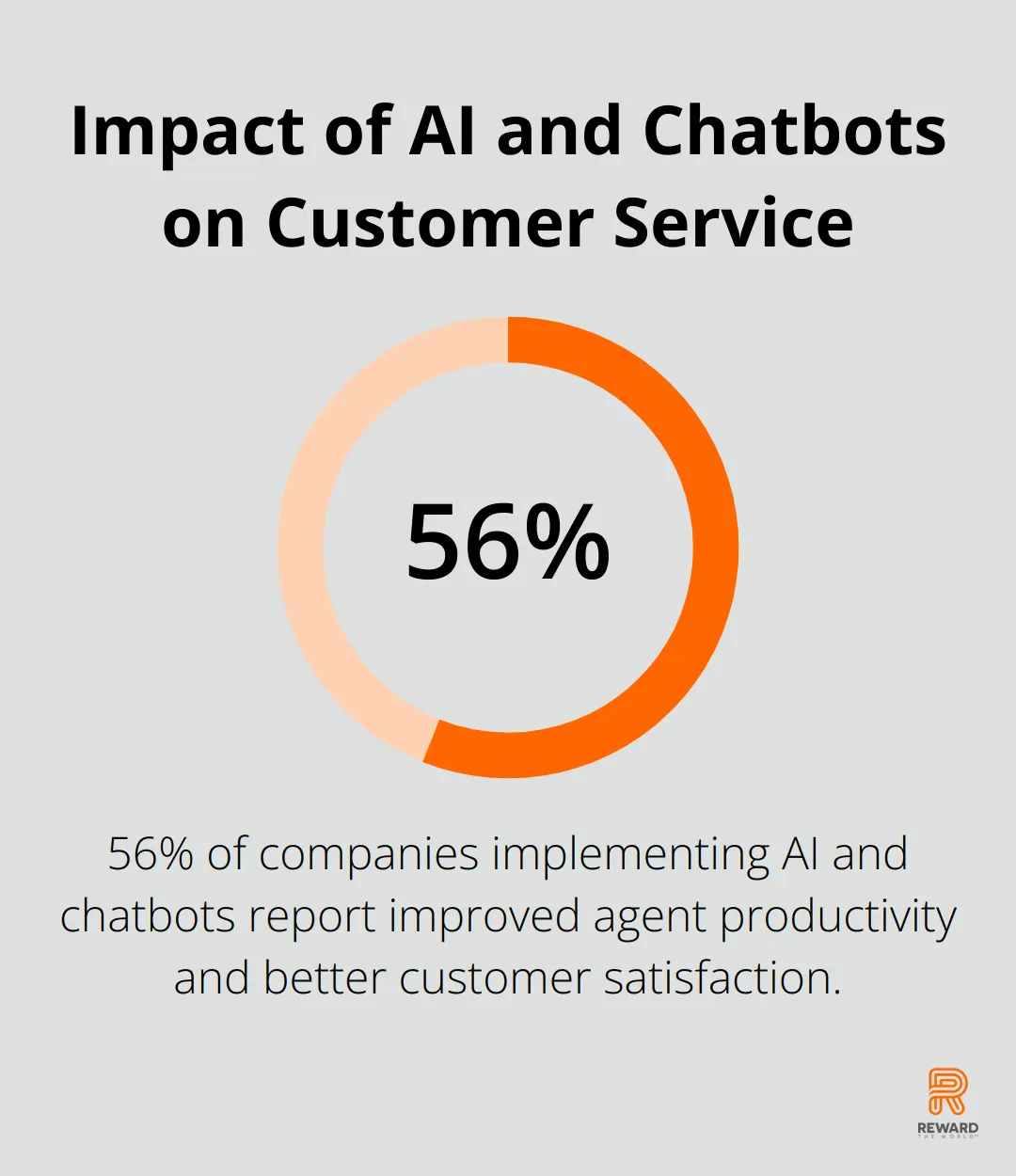
At Reward the World, we’re witnessing a revolution in customer service. AI chatbots are transforming the way businesses interact with their customers, offering round-the-clock support and personalized experiences.
This shift is not just about efficiency; it’s about enhancing customer loyalty and satisfaction. In this post, we’ll explore how AI is reshaping customer service and what it means for your business.
AI Reshapes Customer Service Landscape
AI transforms customer service, setting new standards for businesses aiming to stay competitive and meet evolving customer expectations. This technology isn’t just a trend; it’s becoming the new benchmark for customer interactions.
Round-the-Clock Support Becomes Reality
AI enables businesses to provide 24/7 support, a game-changer in customer service. This technology allows instant responses at any time, which significantly reduces wait times and improves customer satisfaction.
Chatbots handle routine inquiries (freeing up human agents for complex issues). This improvement in efficiency ensures customers receive immediate attention, regardless of time or day.
Scaling Personalization for Millions
AI allows businesses to offer personalized interactions at scale, a feat previously impossible with human-only teams. Through analysis of vast amounts of customer data, AI tailors responses and recommendations to individual preferences and history.
AI uses data to develop new, trusted personalized experiences that make every customer feel like they are the most important. AI makes this level of personalization possible for millions of customers simultaneously (a true revolution in customer service).
Breaking Language Barriers
Multilingual support showcases AI’s excellence. Traditional customer service often struggled with language barriers, but AI-powered translation tools have changed the game. These systems provide accurate, real-time translations, allowing businesses to serve a global customer base without the need for a large, multilingual staff.
This capability proves particularly crucial for global platforms operating in multiple languages and serving millions of users worldwide. AI-powered multilingual support ensures consistent service quality across all markets, enhancing global customer satisfaction and loyalty.

As we move forward, let’s explore how AI enhances customer loyalty through consistent brand experiences and proactive problem-solving.
How AI Boosts Customer Loyalty
At Reward the World, we witness AI’s transformative power in customer loyalty. This technology creates deeper, more meaningful connections with customers. Let’s explore how AI reshapes the loyalty landscape.
Unified Brand Experience Across Channels
AI delivers a consistent brand experience across all customer touchpoints. Whether customers interact with a chatbot on a website, a virtual assistant on a mobile app, or through social media, AI maintains uniform tone, style, and information. This consistency builds trust and reinforces brand identity.
A study reveals that 73% of customers expect better personalization as technology advances. AI enables this by maintaining a unified customer profile across all channels (ensuring each interaction builds upon the last).

Proactive Problem-Solving
AI predicts and prevents issues before they occur. Through analysis of patterns in customer behavior and historical data, AI identifies potential problems and takes proactive measures.
In the telecommunications industry, AI systems detect early signs of network issues and initiate repairs before customers experience service disruptions. This approach prevents customer frustration and demonstrates a company’s commitment to service quality.
AI-driven personalization allows businesses to tailor their offerings to individual customer needs and preferences, helping brands create tailored loyalty programs for their customers.
Data-Driven Customer Insights
AI processes and analyzes vast amounts of data, providing businesses with unprecedented insights into customer behavior and preferences. These insights enable companies to make data-driven decisions that enhance the customer experience and foster loyalty.
AI analyzes purchase history, browsing behavior, and customer feedback to identify trends and preferences. Companies use this information to create personalized product recommendations, targeted marketing campaigns, and guide product development.
A Salesforce survey found that 65% of customers expect companies to adapt to their changing needs and preferences. AI makes this level of understanding possible, enabling businesses to consistently meet and exceed customer expectations.
AI-Powered Loyalty Programs
In loyalty programs, AI identifies which rewards appeal most to individual customers, predicts when a customer might churn, and suggests personalized offers to re-engage them. This level of personalization transforms traditional loyalty programs into powerful tools for customer retention and engagement.
As we move forward, we’ll explore practical steps for implementing AI in your customer service strategy, ensuring you harness its full potential to enhance customer loyalty and drive business growth.
How to Implement AI in Customer Service
Select the Right AI Tools
Implementing AI in customer service transforms your entire approach to customer interactions. The selection of appropriate AI tools is essential. Assess your specific needs first. Do you want to automate routine inquiries, provide personalized recommendations, or analyze customer sentiment? Each goal requires different AI capabilities.
For basic customer queries, a rule-based chatbot might suffice. More complex interactions need advanced natural language processing (NLP) capabilities. NLP enables computers and digital devices to recognize, understand and generate text and speech by combining computational linguistics and rule-based modeling.
When choosing AI tools, consider scalability and integration capabilities. Your solution should integrate seamlessly with your existing customer relationship management (CRM) system and other business tools (ensuring a smooth flow of customer data across all platforms).
Train Your AI with Quality Data
The effectiveness of your AI system depends on the quality and quantity of data you use. Consolidate customer data from all touchpoints – website interactions, purchase history, support tickets, and social media engagements. This comprehensive dataset forms the foundation of your AI’s knowledge base.
Involve your customer service team in the training process. Their insights into common customer issues, preferred solutions, and brand voice are invaluable. Create a feedback loop where human agents correct and improve AI responses (ensuring the system learns and evolves continuously).
A study by MIT Sloan Management Review shows that companies actively involving employees in AI implementation are 5.9 times more likely to see significant financial benefits from the technology. This collaborative approach improves AI performance and helps gain employee buy-in for the new technology.
Balance AI and Human Touch
AI can handle a significant portion of customer interactions, but the human touch remains irreplaceable for complex issues and emotional situations. Develop a clear escalation protocol where AI systems transfer complex queries to human agents seamlessly.
Train your human agents to work alongside AI. They should pick up conversations where AI left off, access AI-generated insights, and provide that extra layer of empathy and problem-solving that machines can’t replicate.
According to a report, 56% of companies that implement AI and chatbots report improved agent productivity and better customer satisfaction. This balance leverages AI’s efficiency while preserving the emotional connection that builds long-term customer loyalty.

Continuously Monitor and Improve
Implementing AI requires an ongoing process of refinement. Set up robust analytics to track key performance indicators (KPIs) such as response times, customer satisfaction scores, and resolution rates. Analyze this data regularly to identify areas for improvement.
One important KPI is the Customer Effort Score, which measures how easily customers can resolve their problems. Calculated on a scale of 1 to 5, this KPI is a powerful predictor of customer satisfaction.
Encourage customer feedback on their AI interactions. This direct input helps fine-tune your AI system and ensures it meets customer expectations. The goal is not just to automate but to enhance the overall customer experience.
These steps will help you effectively implement AI in your customer service strategy, creating a more efficient, personalized, and satisfying experience for your customers. As you start this AI journey, the technology serves as a tool to augment and empower your human team, not replace them. The most successful implementations find the sweet spot where AI efficiency meets human empathy.
Final Thoughts
AI revolutionizes customer service, setting new standards for businesses worldwide. We at Reward the World witness how AI chatbots transform customer interactions, enhance loyalty, and drive business growth. The future of customer service will feature more sophisticated AI systems that handle complex queries, predict customer needs, and provide hyper-personalized experiences.
Companies reduce operational costs, increase efficiency, and gain valuable insights into customer behavior with AI. Customers benefit from 24/7 support, personalized interactions, and quicker issue resolution. The key to success lies in balancing AI efficiency with human empathy to create exceptional customer experiences that foster long-term loyalty.
Reward the World offers a comprehensive platform that uses AI to enhance customer loyalty and engagement. Our solution provides instant reward delivery, seamless integration, and robust analytics (making it easier for businesses to implement AI-driven loyalty programs). The journey to integrate AI into loyalty programs starts with a clear strategy and the right tools.
